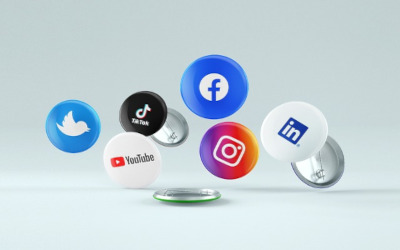TikTok originated in China, and it was released in 2016. In China, it is mainly known by the name Douyin, which means ‘Shaking sound’. It is owned by the Chinese internet company ByteDance. The international version was released the next year, and then it was called Musical.ly. TikTok is a short-form video hosting service where its users can upload and watch videos with a duration from three seconds to ten minutes. These videos can be done by amateurs and professional creators. Everyone can add to their videos special effects like filters, background music, stickers, collaborations, green screens, and so on. TikTok also has something called the ‘For You’ page. This is a feed that is created almost individually for every user. It is based on the user’s activity and interactions with other content. In 2017, TikTok started to gain popularity. In 2019 and 2020, it was the most popular app. In 2019, it was downloaded 693 million times, and in 2020, it was downloaded 850 million times. The app is expected to surpass 1.8 billion users by the end of 2024.
Most users of TikTok are under 30 years old. The biggest number of users are between 18 and 24. The platform itself is mainly for entertainment and comedy. The popularity of TikTok has also led to some viral trends in food, fashion, beauty, music, dance, and so on.
Due to privacy issues, mental health problems, false information, offensive content, and its role during the Israeli-Hamas war, TikTok has come under scrutiny. Many countries have sanctioned, prohibited, or attempted to restrict TikTok to protect children. They have also tried to do all of those things because of national security concerns about the potential collection of user data by the Chinese government through ByteDance.
The concept of social media addiction refers to the persistence of addiction-like symptoms or a lack of self-discipline in relation to social media. So far, the previous studies have been done on Facebook, Instagram, and other older social media platforms. There’s not a lot of research on TikTok. There’s a study where the researchers tried to get more information on how social media addiction is correlated with stress. They found out that people who were more addicted to social media had a lower capacity for mindfulness. And at the same time, many mental health experts have also noticed the effects on mental and emotional well-being. Experts tend to define problematic TikTok use as a behavioural addiction. Social media addiction might decrease productivity and success in work, education, and other areas of life. The study also showed that people with addiction choose to solve their problems more with emotions than with problem-focused coping.
Similar to Instagram, Facebook, and other social media platforms, TikTok’s algorithm chooses the content for its users. This can make the platform addictive for certain users. The TikTok algorithm uses likes, watch time, and shares to choose the best content for every user, and through that, the user will spend more time on the site. TikTok creates the ‘ForYou’ page, and this builds between a user and the app an emotional connection, which increases the appeal of the app even more. The other addictive part of this app is that there are an endless number of short videos, and you don’t have to wait for them. You just have to swipe to see new content. For example, on YouTube, the videos are usually a lot longer, and they can also contain advertisements. Therefore, the users don’t spend so much time in there and watch fewer videos.
People like short videos. On average, TikTok videos are only 15 seconds long. This gives us good emotions in a really short period of time. The other good thing is that the videos are also on-trend. If something makes us feel good, then dopamine is released, and the release of dopamine makes us want it more.
TikTok has decreased our attention span a lot, and because of that, our cognitive skills are also suffering. This problem has been named a ‘TikTok Brain’. That means that we don’t want to sit down anymore to watch a whole movie or a YouTube video. Our brain wants or craves dopamine. When we watch a movie, it takes time to get the good emotions. When swiping on TikTok, we get the content we like fast. There’s a study where TikTok users say that videos that are longer than one minute are ‘stressful’. The reason we like TikTok so much is that we can watch so much more videos in the same amount of time as it would take us to watch one movie.
Since TikTok is consuming a lot of our time, here are some suggestions on how to spend less time there and enjoy other fun activities. You should start to record the time you actually spend on the app. This can help you determine how much time it actually takes. Don’t fallow content that doesn’t add real value to your life. It’s also good to give yourself a time limit on how much time you can spend on TikTok. For example, in the afternoon and before 8 p.m. And the best thing is to find other things to do instead of spending time on the app. For example, start with a hobby that has nothing to do with the internet.

https://pixabay.com/photos/social-media-social-networks-icons-6363633/
Sources:
https://en.wikipedia.org/wiki/TikTok
https://www.investopedia.com/what-is-tiktok-4588933
https://www.businessofapps.com/data/tik-tok-statistics/
https://sites.brown.edu/publichealthjournal/2021/12/13/tiktok/
https://www.choosingtherapy.com/tiktok-addiction/
https://www.ncbi.nlm.nih.gov/pmc/articles/PMC9486470/
https://www.healthtechdigital.com/why-is-tiktok-so-addictive-experts-weigh-in-amid-new-safety-feature/
https://www.bbc.com/news/uk-wales-62720657
http://www.digitalresponsibility.org/how-to-spend-less-time-on-tiktok-and-why-its-so-addictive
